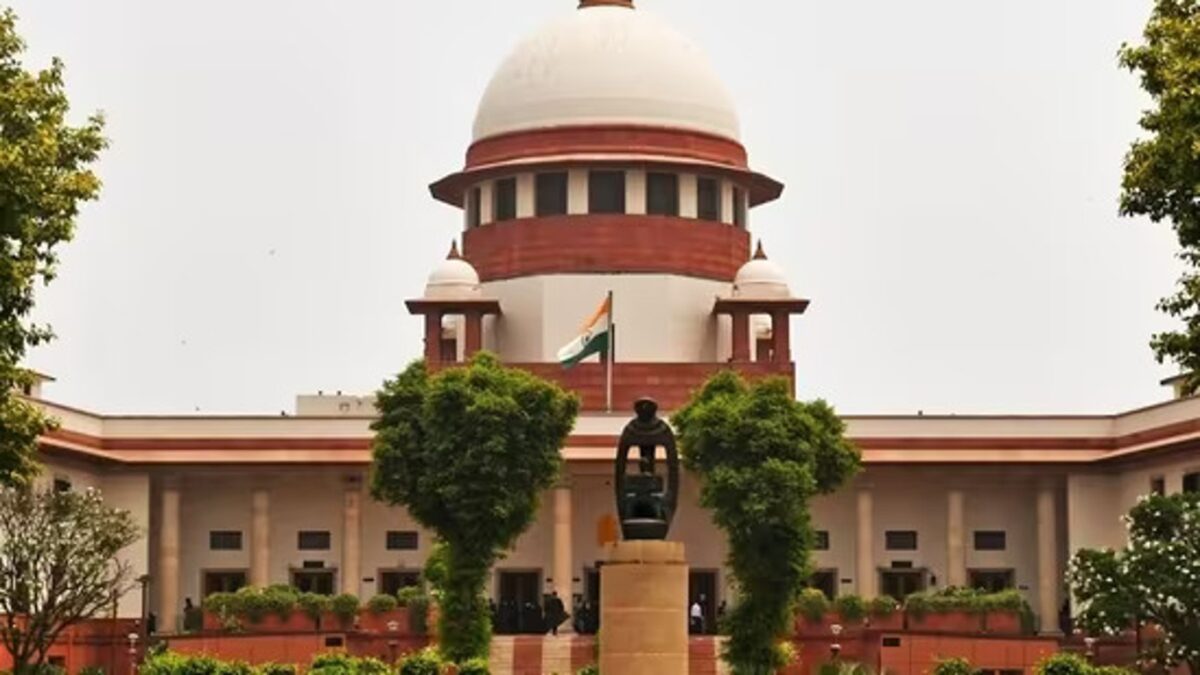Parmesh Shahani On The Need For LGBTQ Inclusion In Corporates, Trans Needs, Caste, And More
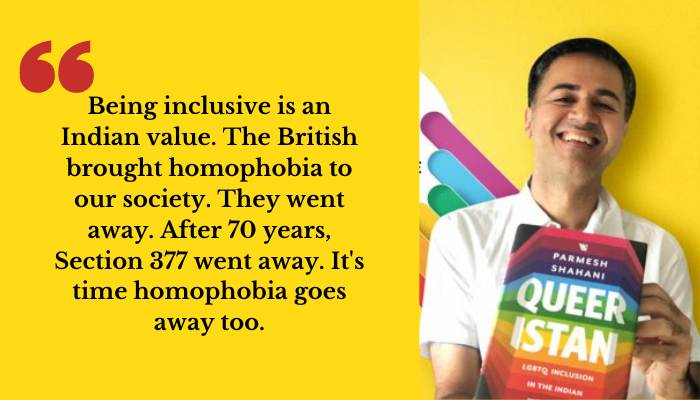
Written by: Team Ungender Insights
Parmesh Shahani is the founder of the award-winning Godrej Culture Labs, known for being an experimental idea space that starts important conversations and brings together the best of India’s diverse culture. He’s currently the Vice President at Godrej Industries, Ltd. Parmesh is a prominent advocate of LGBTQ inclusion in the country. In 2008, he authored his first book “Gay Bombay: Globalisation, Love and (Be)Longing in Contemporary India”.
In conversation with Ungender Legal Advisory’s Director of Communications, Rituparna Chatterjee, Parmesh talks about his second book “Queeristan: LGBTQ Inclusion at the Indian Workplace” which is being published by Westland Books on the second anniversary of the Section 377 judgment.
Rituparna: Congratulations on the book! How have the reviews been so far?
Parmesh: The reviews have been great. The book is resonating across so many different audiences. It’s a business book for namesake, it’s very much my own personal journey. It’s got songs, dances, masala, parents, you know the works in it. It’s a business book but written very differently. I was a little apprehensive if people would get it, if people would want to go on this journey. But thankfully people are loving it and receiving it well!
Why Corporate India Needs To Prioritise On Diversity & Inclusion



Rituparna: In the ten years of your work at the Godrej Culture Labs, did you, at any point, think we’re approaching the issue of Diversity and Inclusion (D&I) wrong? Corporates approach D&I like it’s charity whereas it’s a smart thing to do for growth.
Parmesh: It’s one of the main reasons why the book was written. I was fed up with companies thinking that D&I was some kind of benevolence, some kind of favour. The whole idea is that any pillar of diversity, whether it is LGBTQ, PwD or caste, are the many manifestations of D&I. In any pillar of diversity that you’re (the Company) engaging in, you’re benefiting. You’re going to make more money. You’re getting more talent. You’re getting more innovative. The entire premise of the book is this – that it is you, as a company, that will benefit, which is why it’s in your advantage to think of inclusion strategically and comprehensively. Not just as a ‘cherry on the cake’, or as something that you tick off a box.
Post-Covid, this will especially be very important. Everyone is doing this ‘new normal’ nonsense. How will we enter a ‘better normal’ or a ‘new normal’ without having diverse teams? Your diverse teams are going to think out of the box, present you with solutions, ideas, alternatives, inform you about audiences that are very much a part of the society, so they can be served better. These audiences are groups which are under-represented or not-represented in corporate scenarios.
I was very angry with the companies and their approaches because I thought it was superficial and uninformed. But I must also say that over a decade of doing this work and the past two years of writing this book, I’ve realised that companies are becoming more and more informed. They’re realising that D&I is ultimately for their own good and that they need to be more comprehensive in their approach.
Rituparna: Godrej has always had a very strong D&I policy. How did Godrej go about it and get D&I right? Why was it easy for Godrej and not other companies?
Parmesh: Even at Godrej, we’re in very early stages. We’ve got it right, in terms of intent. We need to get it right, a lot more, in terms of implementation, percolation, and so on. Even for us (Godrej), I don’t want anyone reading to feel that we’ve got it 100 percent right. It’s an ongoing journey.
As I wrote in the book, when I took it to my bosses – Nisa and Sumit, they were like, “Oh, we didn’t know, we didn’t have these policies.” That’s why I say, I think a large number of Indian companies are ignorant or unaware because no one has asked and because the companies don’t have that kind of diversity across the board. It’s something that doesn’t occur unless someone asks, “hey, what about this?” Once we started asking questions, Godrej went on a very good learning journey.
Over the years, we’ve been doing everything right in terms of policies whether it’s non discrimination, same sex partnership benefits, gender affirmation, and so on. Senior leadership is very much on board – the translation of that intent then goes into mid-management and more active hiring. What I think Godrej got right was that senior management got it completely. Also, Nisa, my boss, recognised that inclusion aligned very strongly with Godrej’s founding values – it’s a 120-year-old company seeded very much in the Swadeshi movement.
In the book I make a very strong argument that being inclusive is an Indian value. It is desi to be inclusive. Indian companies ought to be inclusive. In fact, homophobia is a Western input. The British brought it (homophobia) into our society and country. They went away. After 70 years, 377 went away. It’s time that homophobia goes away.
Two Years Since Section 377 Was Scrapped, What Should The Next Steps Be
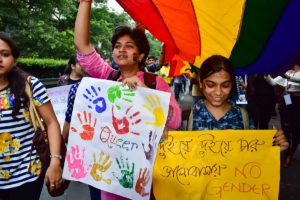


Rituparna: It took us almost two decades to scrap one part of Section 377. The next battle is for queer marriages to get recognition. It’s been a long battle. On the one hand, the reality is that the queer community experiences day-to-day struggles with respect to identity, basic rights, bodily safety, and on the other hand, we’re envisioning members of the queer community to hold aspirational positions in organisations. How can companies help bridge this gap in a holistic way?
Parmesh: I think there are multiple steps after decriminalisation, not necessarily marriage equality. The truth is before the 2018 verdict, there were two other incredible verdicts that helped the 2018 verdict. The first one is the NALSA judgment that gave our trans citizens incredible framework to assert their rights, and the second was the ‘Right to Privacy’ 2017 verdict. In 2018, decriminalisation happened but the spirit of NALSA has not resulted in a good Trans Act. One of the first things that we all have to do in the community is to talk about why the Trans Act, in its current form, is not at all optimum. It does not work. It’s a disservice to our trans community and needs to be modified.
There’s a bunch of things that have to happen legally, one is this problematic Trans Act that needs to be modified, we need to bring anti discrimination legislation across the country, and then other things like marriage equality, and so on. We can fight legally on multiple fronts.
What companies can do in the workplace – serve as useful environments in which one can model a good, safe and nurturing space. So many companies are doing that whether in creating policies that are respectful, not just anti discrimination, same sex partnership benefits but so many progressive companies in India are now offering gender affirmation surgeries as part of regular benefits.
Companies can start offering these benefits – in the culture that one creates in the corporation, in the active hiring of LGBTQ people, especially, trans employees. Companies can role model what good behavior is because we do spend a large amount of our time in our workspaces, right? If we can create inclusive workspaces not just in offices but also educational institutions – then the inclusive conversations seep back into the home.
One of our realisations at Godrej – because we’ve gone on this LGBTQ inclusion journey and have been talking about it so much at the company – is that so many of our employees go back and talk about it with their families. The kids will go and talk about it in college. That’s how society changes – on multiple fronts.
Why Trans Specific Policies Are Important For Inclusion At The Workplace
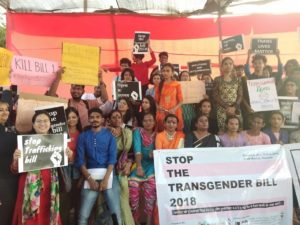


Rituparna: When we talk of LGBT inclusion, we tend to homogenise the queer community’s needs and have a one-requirement-fits-all approach. Whereas, trans folks who apply for certain jobs in certain sectors need a specific kind of work environment and protections. Do you think companies need to have a trans inclusion policy and not club it with their overall D&I policies?
Parmesh: In my book, there’s an entire chapter which talks about Trans Specificity. I’m talking about very basic points like, documentation that the HR Department needs to do. If someone has transitioned, they might have a school leaving certificate in one gender, and a college certificate in another. You need to sensitise HR, not to say, “Why are these certificates in two different genders?” but to understand and accept both certificates. A lot of this – whether it’s opening bank accounts, having a clear washroom policy (saying, if you can have an all-gender washroom that anyone could access, if they don’t wish to go to washroom of either gender), helping with commute, and housing.
A couple of years ago, Kochi Metro hired many trans people but unfortunately, many of them had to leave their jobs as housing was becoming an issue. Then Kochi metro had to rethink their approach and began to help with housing. With trans people, certainly there are specificities that any company needs to understand and engage with, not again out of a feeling that we’re going an extra mile or we’re doing something special but recognising that everyone is different.
In my own company, I have to explain this to so many of my colleagues and certainly in other companies where people say, “if we offer gender affirmation surgeries, will it mean, many trans people will join us to do the surgery?” I have to explain that it takes a long time to transition and that person will have to go through several phases. If they’re joining you because you’re offering this benefit, then it’s good for you. If you’re offering this benefit, they’re likely to stay with you for a long time.
There isn’t enough research in India but research from other parts of the world show that companies which demonstrate inclusivity and create enabling environments, do better in all parameters – whether that’s economic performance, innovation, talent, attraction, retention – everything. It takes time to work through people’s minds, push against so many biases and actually convince them.
For this reason, I’ve included many stories of real people in the book. Besides the numbers, there are real stories. There’s Mohul, who’s a trans man at The Lalit. How empowering it was for Mohul when The Lalit supported their entire journey and what that has meant to Mohul and their family to have a workplace that is so inclusive. There’s Anubhuti at Tata Steel, who transitioned while in Jamshedpur. There’s also Kusuma and Sumyukta Vijayan – these are people in the workplace. The non workplace journeys of Grace Banu, and so many other individuals. Hopefully, people will read these stories and get into the mindset to bring about change.
Queer Leadership In Corporate India
Rituparna: From your own experience, how important is diverse representation in leadership?
Parmesh: It’s fundamental. As a queer person, when you see another queer person not only are you encouraged but you also have someone you can seek mentorship from and that goes a really long way in your career as well. I’ve been blessed as I’ve found support and mentors in LGBTQ allies who knew I was gay and understood that that was a vital part of me. They were very supportive.
For me, it was a process of articulation to myself, and slowly over time, to friends and family. I’ve been out since the mid-2000s to everyone. When I went to the US and came back, I was super out by then, there was no way I was going back to any closet but even before that I got great mentorship and support. I think visibility matters.
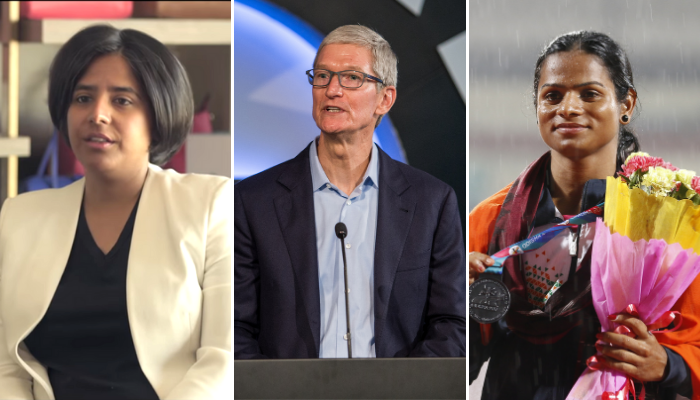


When you have a Radhika Piramal in India as an out-and-proud lesbian Vice Chairperson of the VIP Industries, what does that do to so many young students who are maybe queer, who are like, “Radhika can do it!” Her share price is doing well, profits are doing well. She’s successful. In the same way, Tim Cook might be a role model for queer students in the US. Dutee Chand, as a sportsperson, who’s come out, is proud, and facing and talking very directly, honestly and openly about challenges.
For young people, to see such role models across the spectrum really matters. The more and more queer people in leadership, the better, and not just queer – you need visible diversity across the board.
Time For An Anti Discrimination Law & The Pervasive Problem Of Caste At The Workplace
Rituparna: Do you think it’s time for an anti discrimination law?
Parmesh: I think it was time a long time ago. I think we need a comprehensive anti discrimination legislation and there’s a lot of interesting work happening in different spaces. For example, the Vidhi Center, where a lot of thinking is going on about the road ahead post 377, in terms of the law.
I think it’s time now to stop thinking piecemeal and to stop thinking ‘one after the other’. It should be all-in and comprehensive. We need to change all aspects of our society together. We need to think of inclusion comprehensively. I think that’s also the understanding of the LGBTQ movement in India, where there are so many of the incredible and inspiring future-oriented queer projects – whether it’s the Dalit Queer Project, the Queer Muslim Project, and spaces like Pink List.
A lot of the future imagination of queerness is intersectional. One has to imagine that intersectional queer future and pursue it on all fronts. What I’ve tried to do in the book is make a case for it at the workplace. But that’s just one space and one node where one has to attend to make change. One has to attempt to make change at various other nodes as well.
Rituparna: When it comes to D&I, there’s one thing we still don’t talk about at the workplace – caste and caste-based discrimination. In my chats with D&I leaders, everyone knows it’s there but there’s no response to it. What are your thoughts on it?
Parmesh: I’m glad that the D&I leaders that you’re talking to acknowledge that it’s (caste) there because the D&I leaders that I talk to or the people I interact with, when I try and bring it up, even refuse to acknowledge that caste-based discrimination exists. I think it’s absolutely vital that we talk about caste-based discrimination and we include caste as one of the dimensions of inclusion in companies. You have to do a cursory survey of senior leadership at any organisation, and see how absent a range of voices are. Most senior leadership in any organisation will be upper caste and men. I think it’s very vital that we talk about it.
Having said that, I also know after years of doing this, it is easier to talk about because suddenly over the past few years, and that’s the unfortunate truth, LGBTQ has become a hot topic. People are not happy but they don’t mind talking about it. Gender has been spoken about for years.
Unfortunately, there seems to be a hierarchy even in inclusion, whereas gender is at the top of it, then after that LGBT, PwD are in the second rung. I think people don’t want to talk about caste, religion, ageism, and so many other things at D&I summits, within companies, and so on.
Why Collaboration Is Key For A Good D&I Framework
How does one get around it? Keep tripping. Keep including D&I in conversations. Adopt an intersectional approach. Work with multiple stakeholders. Build solidarities across. We now need to stop thinking in silos that corporate people will do corporate things, NGOs will do NGO things and academics will do academic things. We’re living in a world where we have to collaborate across silos, re-imagine our roles and push each other to do different things.



People in the corporate world need to build deeper linkages with people in the nonprofit sector, with academia, with local and state governments, in ways in which we can imagine win-win scenarios for everyone.
One of the things I talk about in the book is skilling. How can we intersect a skilling imperative with the needs of trans communities to find jobs? We have the Skill India Mission. We can include transgender skilling in state and national-level schemes, so that trans people are better skilled and are able to be hired. Different governments need their skilling objectives. Companies can then have a talent pool of skilled candidates they can hire from. We really need to break across so many of these barriers to think of win-win scenarios. That’s the hope that the book provides an impetus to some of this.
You can watch the Instagram Live, here.
Video Highlights
07:12 – The Need For D&I In The Post-Covid World
12:47 – What Godrej Did To Get D&I Right
17:19 – The Fight Continues After Scrapping Of Section 377
22:32 – Need For Trans Specific Policies At The Workplace
28:43 – Importance Of Queer Representation In Leadership
32:04 – The Future Of Queer Is Intersectional
35:04 – The Need For Collaboration To Achieve True D&I
Ungender Insights is the product of our learning from advisory work at Ungender. Our team specializes in advising workplaces on workplace diversity and inclusion. Write to us at contact@ungender.in to understand how we can partner with your organization to build a more inclusive workplace.
Read our insights about diversity, legal updates and industry knowledge on workplace inclusion at Ungender Insights. Visit our Blog.
Sign up to stay up-to-date with our free e-mail newsletter.
The above insights are a product of our learning from our advisory work at Ungender. Our Team specialises in advising workplaces on gender centric laws.
or email us at contact@ungender.in



